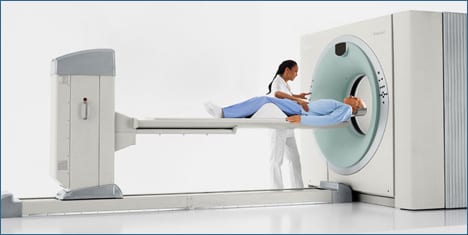
Nuclear Medicine
Nuclear medicine imaging uses small amounts of radioactive material, a special camera and a computer to create images of the inside of your body. It provides unique information that often cannot be obtained using other imaging procedures to help diagnose many types of cancers, heart disease, gastrointestinal, endocrine, neurological disorders and other health conditions. Because nuclear medicine procedures are able to pinpoint molecular activity within the body, they may detect disease in its earliest stages when it is most easily treated. Nuclear medicine studies are often dependent on active processes in the body rather than anatomic appearance.
Preparation:
(Info from RadiologyInfo.org)
You may be asked to wear a gown during the exam or you may be allowed to wear your own clothing.
Women should always inform their physician or technologist if there is any possibility that they are pregnant or if they are breastfeeding. See the Safety page for more information about pregnancy and breastfeeding related to nuclear medicine imaging.
You should inform your physician and the technologist performing your exam of any medications you are taking, including vitamins and herbal supplements. You should also inform them if you have any allergies and about recent illnesses or other medical conditions.
You should inform your physician if you have had a recent heart attack or myocardial infarction, asthma, a chronic lung disease, or aortic stenosis. Also, if you have problems with your knees, hips, or keeping your balance, tell your doctor as this may limit your ability to perform the exercise needed for this procedure.
Jewelry and other metallic accessories should be left at home if possible, or removed prior to the exam because they may interfere with the procedure.
You should avoid caffeine (caffeinated as well as decaffeinated coffee, hot and cold tea, caffeinated soft drinks, energy drinks, chocolate and medications containing caffeine, etc.) and smoke for up to 48 hours before your examination. Your physician or radiologist may give you more specific instructions.
You should not eat or drink anything after midnight on the day of your procedure, but you may continue taking medications with small amounts of water unless your physician says otherwise. If you take beta-blocker medication (Inderal, metoprolol, etc.) you should specifically ask your physician about temporary discontinuation.
For more information about specific tests, please select from the list below:

Bone Scans (Skeletal Scintigraphy)
Hepatobiliary Nuclear Medicine (HIDA Scans)
